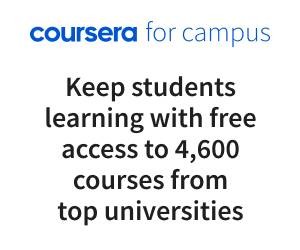Hybrid education allows learners to access relevant courses, providing students with the flexibility to realise their goals
Round table held in November 2021.
The Covid-19 pandemic pushed teaching online and changed the world of academia. Now, as students return to campus, institutions in Italy need to decide which aspects of hybrid education work for faculty and students, according to the panellists of a Times Higher Education round table held in partnership with Coursera for Campus.
“Each course, each professor, each student group will need a different recipe,” said Marco Cantamessa, professor and delegate to the rector at the Polytechnic University of Turin in Italy.
Learners have also evolved, said Sami Eltom, partnerships director at Coursera. “Learners have become more confident in asking for [something] outright and saying, ‘this doesn’t work for me’, or ‘I want to be able to learn in a different way’.” Coursera partners with 6,500 governments and organisations to provide its 92 million learners with the theory, practical and technical skills required by employers.
Increasingly, faculty are becoming gatekeepers rather than solely providers of information, the panellists said. “The key discernment that each lecturer must learn is what absolutely must be [conveyed] through your own interaction with students, and what is a commodity that students can go out and learn,” said Eny Di Iorio, dean of academic development at the Lorenzo de’ Medici Institute in Italy. “Now that is something that is radically different from the traditional model of the professor.”
Carla Olivieri, associate professor of applied biology at the University of Pavia in Italy, cautioned that some students take advantage of this self-guided approach and look to reduce their workload and attendance as much as possible.
However, the reality is that graduates require skills that they are not acquiring during their studies. “A lot of the time, we talk about artificial intelligence, machine learning or data science, while actually there are some fundamental skills that during the K-12 journey, or even the university journey, can go missing,” Eltom said.
Cantamessa gave the example of students who are well versed in Python programming language but do not know how to use the spreadsheet program Excel. Italy’s economy is dominated by small and medium-sized companies, he said; “How do we make sure that our students don’t only go to large multinational companies abroad, but also have the skills that make them of interest to small companies?”
At the same time, some skills are rapidly becoming obsolete. “There’s a real focus on how do we adequately prepare students for the workforce when the speed of change within that workforce is increasing at a rapid rate,” said Bhavin Bhagalia, partnerships director for EMEA at Coursera.
Cantamessa said faculty face the conflicting responsibility of giving students skills that are immediately in demand, but also long-lasting skills that will allow them to stay ahead of rapid change in the workplace.
Ultimately, he said, the most important skills a teacher can give their students is the ability to learn. “With that learning skill, they will learn something now, but also, they will have the ability to learn [again] in the future,” Cantamessa said.
The panel:
- Bhavin Bhagalia, partnerships director for EMEA, Coursera
- Marco Cantamessa, professor and delegate to the rector, Polytechnic University of Turin
- Sami Eltom, partnerships director, Coursera
- Eny Di Iorio, dean of academic development, Lorenzo de’ Medici Institute
- Alistair Lawrence, special projects editor, Times Higher Education (chair)
- Carla Olivieri, associate professor of applied biology, University of Pavia
Watch the round table on demand above or on the THE Connect YouTube channel.
Find out more about Coursera for Campus.










































































